Recent ISAC Publications
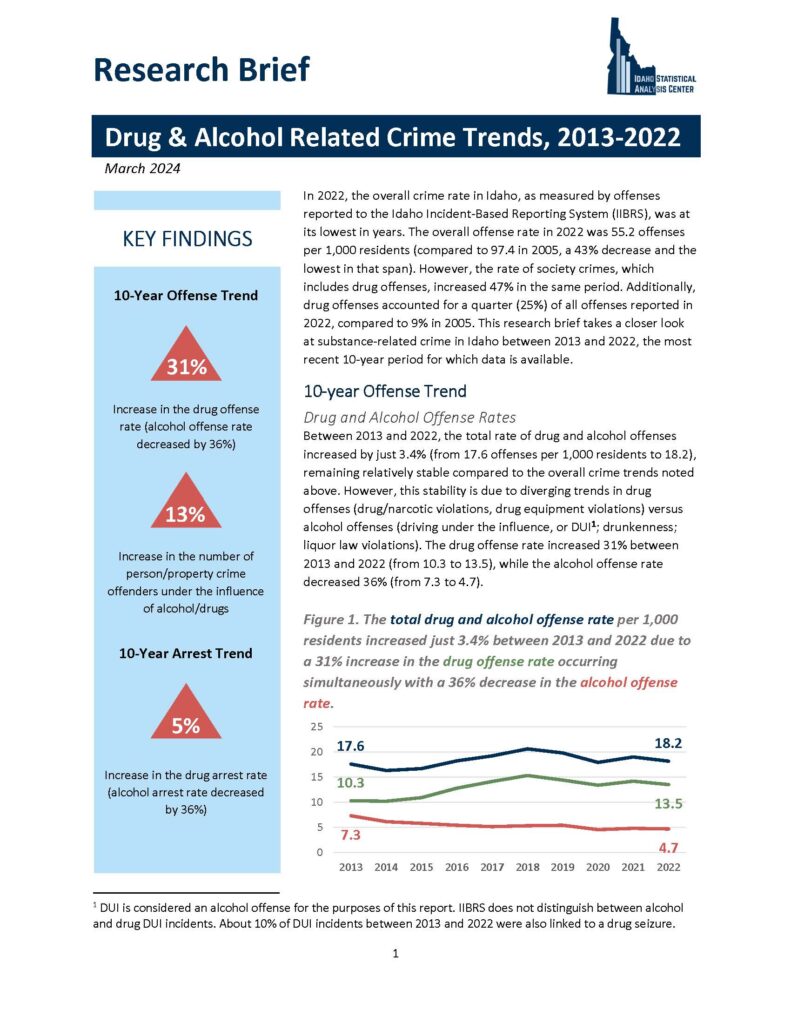
Drug & Alcohol Related Crime Trends, 2013 – 2022
March 2024
This research brief presents analysis of data on drug and alcohol related crime from the Idaho Incident-Based Reporting System (IIBRS), focusing on the 10 most recent years of data (2013 to 2022). The brief includes state-level data analysis, as well as county-level arrest rates by drug type for 2022.
Although the rate of total drug and alcohol offenses fluctuated slightly between 2013 (17.6 offenses per 1,000 residents) and 2022 (18.2), the drug offense rate increased 31% during that time (from 10.3 to 13.5) while the alcohol offense rate decreased 36% (from 7.3 to 4.7). In 2022, a quarter (25%) of all offenses reported to IIBRS by law enforcement were drug or alcohol offenses, up from 14% in 2013 and 9% in 2005 (the lowest point in that 18-year span).
Demographic data on arrestees indicates that more older individuals were arrested for drug or alcohol offenses in 2022 (average arrestee age was 33.6 years) than in 2013 (28.6 years). A larger share of arrestees were women (30% in 2022, compared to 27% in 2013) and racial/ethnic minorities (68% White and non-Hispanic in 2022, compared to 76% in 2013. Finally, the percentage of person/property crime offenders suspected of being under the influence of alcohol and/or drugs during the commission of those crimes also rose to about 10% in 2022 (up from 7% in 2013).
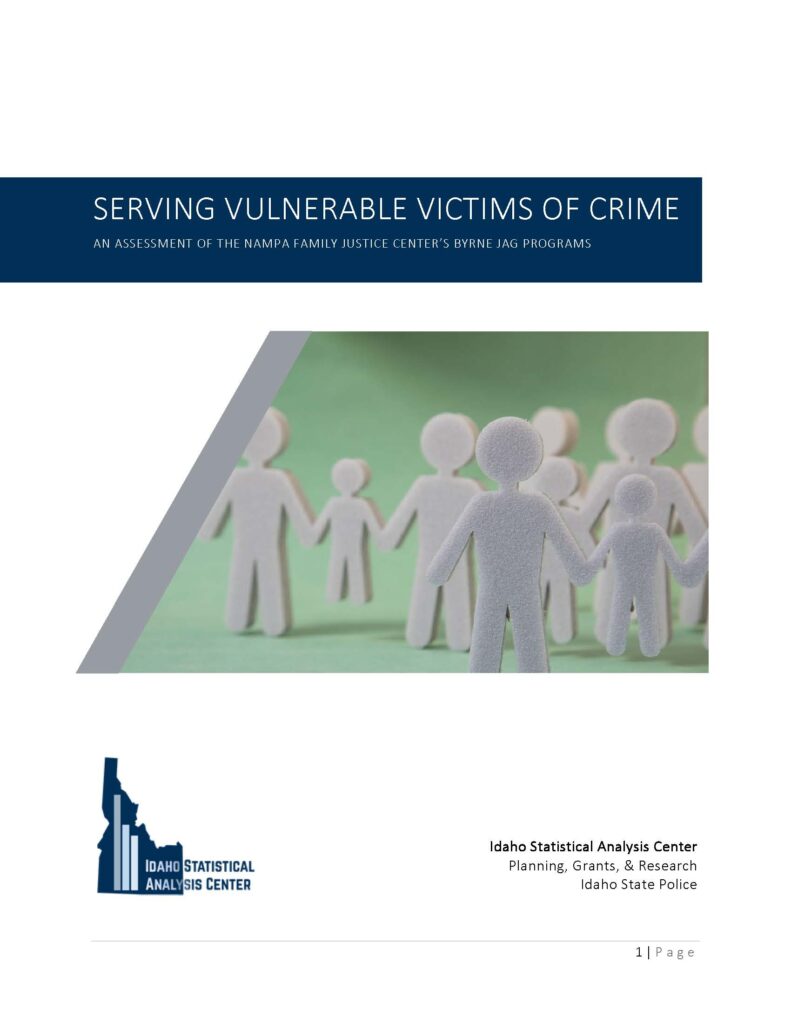
Serving Vulnerable Victims of Crime: An Assessment of the Nampa Family Justice Center’s Byrne JAG Programs
January 2024
This report presents results from an assessment of the Nampa Family Justice Center’s JAG-funded program, which provides services to vulnerable crime victims. Since 2020, the program has focused on expanding services to children, elders, and Spanish speakers. This assessment utilizes data collected between October 2020 and September 2023, with a specific focus on a 12-month period from October 2021 to September 2022.
More than 250 clients were served through the program in the 1-year period. 76% of those clients had repeated contacts with NFJC during the year (client retention is a short-term goal of the program). Additionally, children who participated in Camp Hope Idaho and adults who participated in Making Sense of Your Worth groups experienced significant gains in measures of hope, resilience, and overall self-worth.

This report presents analysis of Idaho Incident-Based Reporting System (IIBRS) data on reported crime, comparing the six-week period during March and April 2020 when a statewide stay-at-home public health order was in place to the same time period in other recent years (2018, 2019, and 2021).
Results indicate that total crime was significantly lower during the six-week period in 2020 compared to other years, dropping 28% from 2019 to 2020, then increasing 34% in 2021. A similar pattern was observed for drug/alcohol offenses, but not for four other offense types. Additionally, a significant drop in total reported crime was observed in mostly urban and mostly rural counties, but not in completely rural counties.
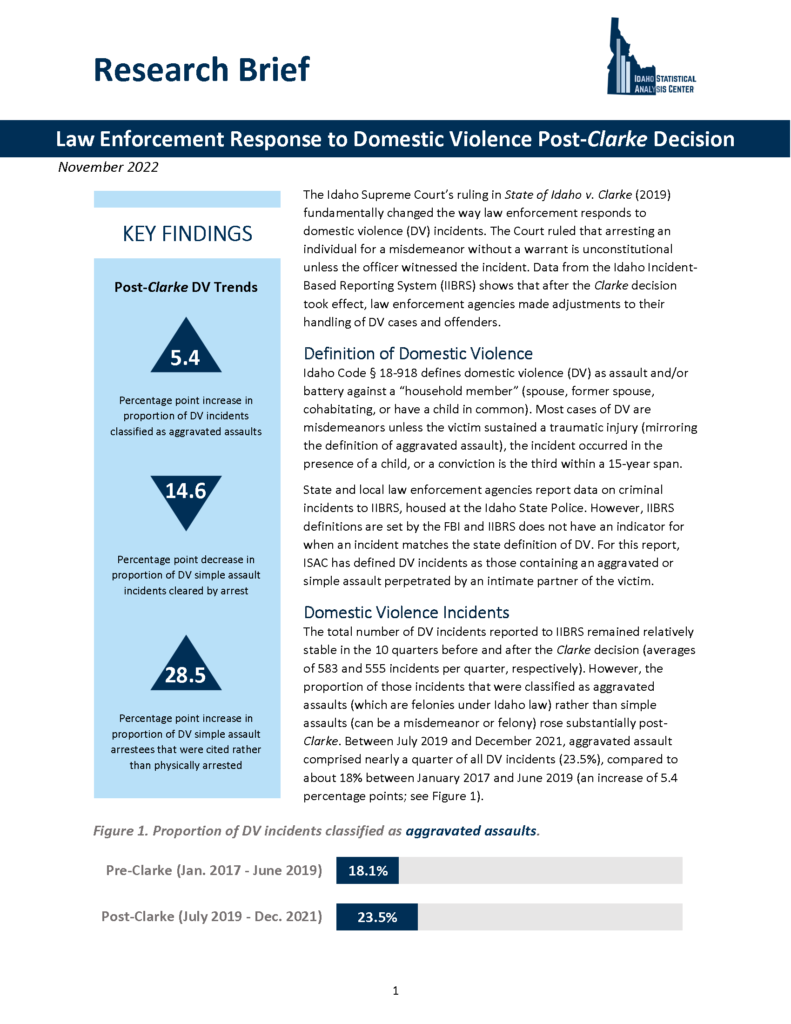
Law Enforcement Response to Domestic Violence Post-Clarke Decision
November 2022
This research brief presents analysis of Idaho Incident-Based Reporting System (IIBRS) data on incidents of domestic violence reported to law enforcement between 2017 and 2021. In June 2019, the Idaho Supreme Court ruled that warrantless arrests for misdemeanors are unconstitutional in Idaho unless a law enforcement officer witnessed the incident; this includes most domestic violence incidents in the state. ISAC analyzed data from the 10 quarters before and after the Clarke decision was issued, focusing on differences in outcomes of simple and aggravated domestic assault incidents.
Results indicate that there are key differences in how domestic assault incidents are being resolved post-Clarke. The proportion of incidents classified as aggravated assault increased about five percentage points after the Clarke decision, although the total number of reported domestic assault incidents remained stable. Additionally, the proportion of simple domestic assault incidents cleared by arrest has decreased almost 15 percentage points, while the proportion of arrestees that were cited rather than physically arrested has increased more than 28 percentage points.
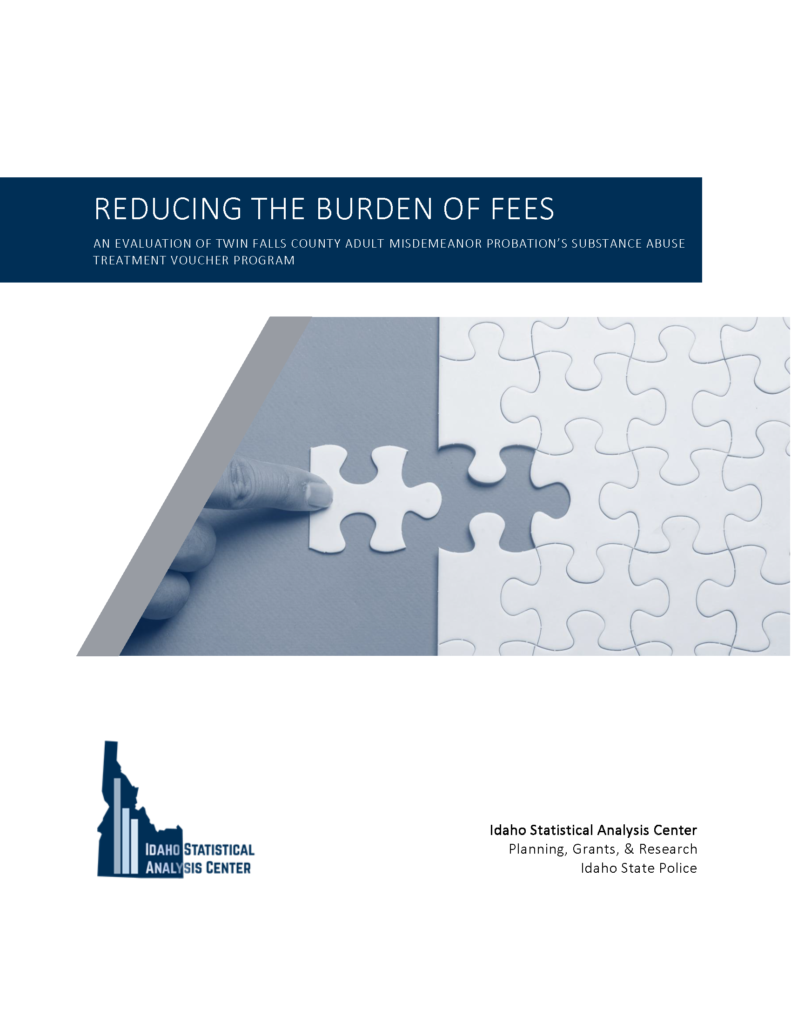
This report presents results from an evaluation of Twin Falls County’s JAG-funded program providing vouchers for substance abuse treatment to those on adult misdemeanor probation for drug- or alcohol-related convictions who cannot otherwise afford services. The program has been running since 2007. This evaluation utilizes data collected between October 2018 and September 2021.
Nearly 100 clients were accepted into the program over a 3-year period and were provided with over 2,600 hours of substance abuse treatment services. Nearly two-thirds of participants (66%) successfully completed the program, and 6-month recidivism rates for graduates was 8% (compared to 10% for similar probationers not enrolled in the program).

This report presents results from an evaluation of Terry Reilly Health Services’ JAG-funded Mentally Ill Offender Community Transition Program (MIO-CTP), a program aimed at ensuring that those exiting Idaho’s prisons are connected with mental health services upon returning to their communities. The program ran for about three years between 2017 and 2020. This evaluation utilizes data from the full duration of the program.
More than 460 clients were accepted into the MIO-CTP between June 2017 and October 2020. Less than a quarter (23%) had a verified mental health diagnosis before entering the program. Less than two-thirds of clients (59%) were directly served through the MIO-CTP, while nearly all clients (94%) were referred to other services not directly funded through the program. Of those who were accepted into the program, 27% were successfully discharged, but only 3% completed the full program; the other 24% transitioned to other programs or moved out of the service area.
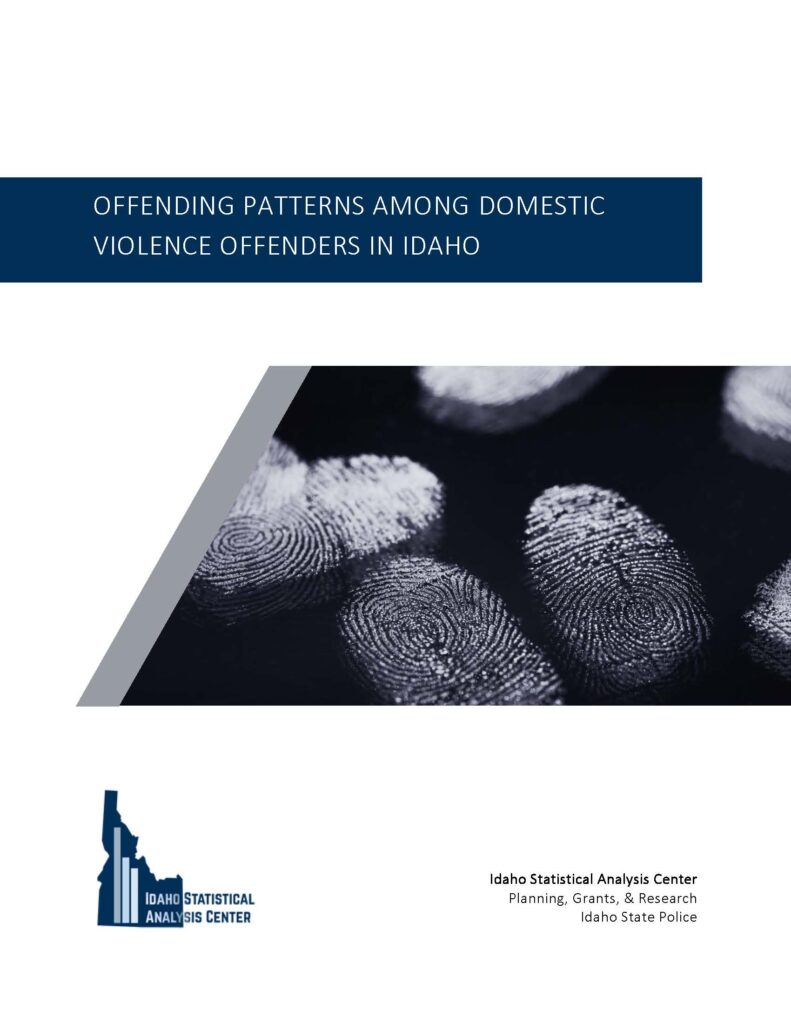
Offending Patterns among Domestic Violence Offenders in Idaho
August 2022
This report presents results from a study of the criminal history records (CHR) of more than 56,000 individuals who have been arrested for a domestic violence (DV) crime in Idaho over the last 35 years. Demographics, criminal histories, and recidivism of DV offenders are all examined here. Additionally, ISAC evaluated the utility of using CHR data for research purposes. The implications of the study findings for public policy are also discussed.
Results indicate that the average DV offender in Idaho was male and in his mid-30s at the time of his first DV arrest. Nearly half of DV offenders (48%) had been previously arrested for a violent, property, or drug crime before their first DV arrest. About 45% of DV cases for which data was available resulted in a conviction for a DV crime. Finally, 40% of DV offenders were rearrested for a new misdemeanor or felony within five years of their first DV arrest, with 17% being arrested on new DV charges. Offender gender, age, and criminal history were significant predictors of recidivism.
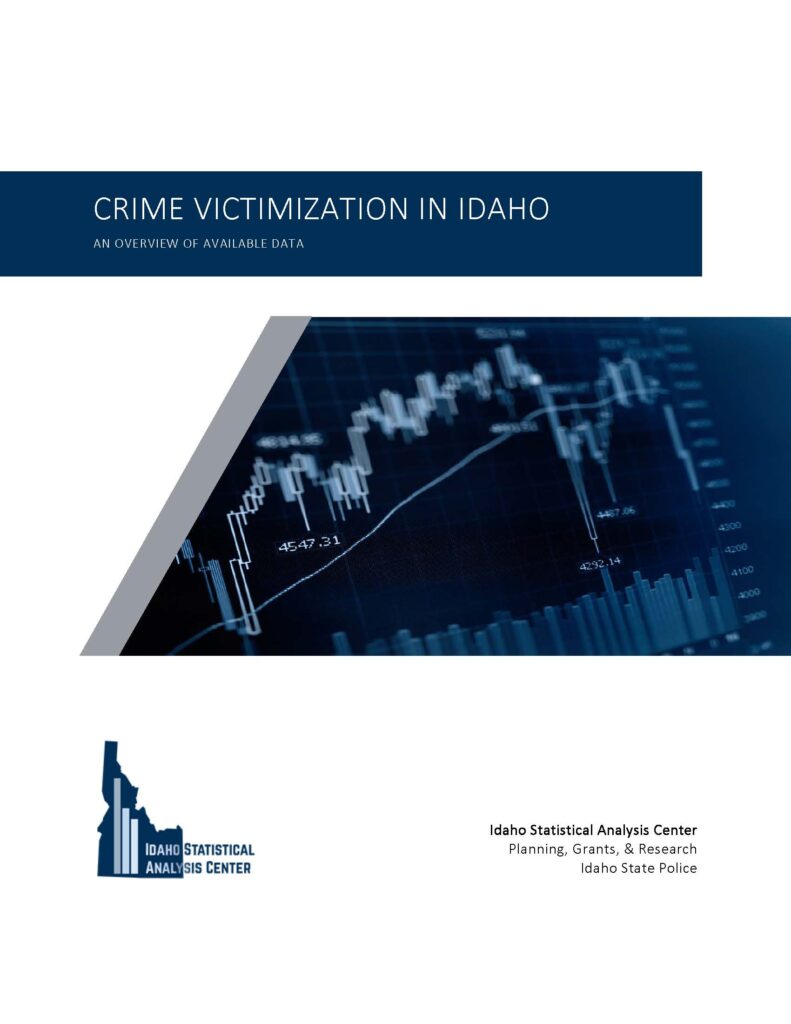
Crime Victimization in Idaho: An Overview of Available Data
August 2022
This report and its companion data dashboard were developed in partnership with the Department of Criminal Justice at Boise State University (BSU) for their Idaho Victimization Clearinghouse website. BSU and ISAC sought to report on the status of victimization data in the state, as well as examine data regarding risk and protective factors that may impact victimization. The report includes an overview of existing data on victimization in Idaho, examines strengths and weaknesses of the data, and makes recommendations for improving the state’s knowledge of crime victimization.
Upcoming Publications
Fall 2023
- Crime Trends
- Research brief series
- Intimate partner violence
- Sexual violence
- Research brief series
Summer 2024
- Justice System Performance Data, Research & Policy Analysis
- Idaho’s Substance Abuse Data
Fall 2024
- Juvenile Crime
- Study of School Resource Officers (SROs)
ISAC Archive
Crime Trends
Domestic/Intimate Partner Violence
- Intimate Partner and Domestic Violence in Idaho: 2009 – 2015
May 2018 - Domestic Violence in Idaho: 2008 – 2013
September 2015 - Domestic Violence in Idaho: 2007 – 2012
September 2013 - Domestic Violence in Idaho: 2005 – 2010
May 2012 - Family and Intimate Partner Violence in Idaho: 2004 – 2007
April 2009 - Special Report: Stalkers in Idaho
April 2008 - Intimate Partner Violence in Idaho: 2002 – 2006
November 2007 - Intimate Partner Violence in Idaho: 1998 – 2005
September 2006 - Intimate Partner Violence in Idaho: 2000 – 2004
June 2005 - Intimate Partner Homicides in Idaho
February 2004 - Intimate Partner Violence in Idaho: 1998 – 2002
November 2003 - Intimate Partner Violence: A NIBRS Analysis
June 2003
Drug & Alcohol Crime
- Idaho Drug and Alcohol Related Arrests and Charges: 2007 – 2014
February 2017 - Idaho Drug and Alcohol Related Arrests and Charges: 2008 – 2013
July 2015 - Idaho Drug and Alcohol Related Offenses and Arrests: 2005 – 2012
July 2013 - Idaho Drug and Alcohol Related Offenses and Arrests: 2006 – 2010
March 2012 - Idaho Drug and Alcohol Related Offenses and Arrests: 2003 – 2007
December 2008 - Drug Offenses, Seizures and Arrests in Idaho: 1998 – 2006
August 2007 - Drug Related Arrests: 1998 – 2004
January 2006 - Suspected Alcohol or Drug-Related Violent Crimes: 1998 – 2004
December 2005 - Special Report: Drug and Alcohol Abuse Among Female Inmates
May 2005 - Drug Arrests and Violent Crime Trends
April 2004 - Idaho’s Drug Arrests and Crime Trends
April 2002 - Idaho’s Drug and Violent Crime Trends
April 2001
Racial/Ethnic Disparities
- Latinos and the Idaho Criminal Justice System: 2005 – 2014
September 2016 - American Indian Crime in Idaho: Victims, Offenders, and Arrestees
March 2013
Sexual Violence
- Sexual Violence in Idaho: 2009 – 2015
August 2017
Violence Against Children
Violence Against Elders
- Elderly Victims of Crime
July 2004
Justice System Performance Data, Research & Policy Analysis
- Crime in Idaho During COVID-19: Time Series Analysis of Data from the Idaho Incident-Based Reporting System
May 2023 - Offending Patterns among Domestic Violence Offenders in Idaho
August 2022 - Crime Victimization in Idaho: An Overview of Available Data
August 2022 - Idaho Sexual Violence Surveillance System: Initial Development and Data Analysis
October 2020 - Idaho Criminal Justice Needs Assessment: A Survey of Criminal Justice Practitioners and Community Leaders (2020)
May 2020 - Criminal Justice in Idaho: Performance Measures Fact Sheets
December 2019 - Idaho Criminal Justice Needs Assessment: A Survey of Criminal Justice Practitioners and Community Leaders (2012)
March 2012 - Assessing the Drug Problem in Idaho by County: A Survey of Criminal Justice Practitioners
December 2003 - Assessing the Drug Problem in Idaho: A Survey of Criminal Justice Practitioners
November 2003
Juvenile Crime
- Characteristics and Outcomes of Justice-Involved Youth in Idaho
September 2018 - School-Based Law Enforcement in Idaho
September 2016 - Crime on School Campuses: 2005 – 2010
November 2011 - Idaho’s Juvenile Crime: 2002 – 2007
November 2008
Program Evaluations
- Serving Vulnerable Victims of Crime: An Assessment of the Nampa Family Justice Center’s Byrne JAG Programs
January 2024 - Reducing the Burden of Fees: An Evaluation of Twin Falls County Adult Misdemeanor Probation’s Substance Abuse Treatment Voucher Program
November 2022 - Establishing Continuity of Care: A Report on the Terry Reilly Health Services Mentally Ill Offender Community Transition Program
November 2022 - Crossover Youth in Eastern Idaho: Results from the District 6 Crossover Youth Practice Model Pilot Project
October 2021 - An Evaluation of the Idaho State Police Emphasis Patrols in Construction Zones
March 2015 - Process Evaluation of a Non-Profit Youth Services Agency: Original Gangster’s Basic Academy for Development
July 2014 - An Evaluation of a Comprehensive Community Initiative: Switch-Track
March 2012 - To Protect and Serve: A Look at a Collaborative Effort to Address Domestic Violence
June 2008 - Idaho State Police Allocation Study
November 2007 - Impact Evaluation of the Nez Perce Domestic Violence Unit
July 2004 - Canine Drug Program Cost Analysis
March 2004 - The Kootenai County Domestic Violence Initiative: A Process Evaluation
October 2003 - Pocatello Women’s Correctional Center Domestic Violence Program: Process and Outcome Evaluation
June 2003 - The Advocates: A Domestic Violence Victim Services Project
June 2003 - Process Evaluation of the Kootenai County Drug Court
October 2002 - Idaho Day Reporting Recidivism Report
April 1999
Recidivism Studies
Research Briefs
Drug & Alcohol Related Crime
Intimate Partner Violence
- Law Enforcement Response to Domestic Violence Post-Clarke Decision
November 2022 - Intimate Partner Violence in Idaho, 2020
December 2021
Sexual Violence
- Sexual Violence in Idaho, 2020
December 2021
Victimization
Victimization Research
- Forensic Interviews in Idaho: Current Challenges and Opportunities for Coordinated Service Delivery
October 2019
Idaho Crime Victimization Surveys
- Idaho Crime Victimization Survey: 2012
April 2014 - Idaho Crime Victimization Survey: 2005
December 2007 - Fear of Crime: How Safe do Idahoans Feel?
October 2004 - Idaho Crime Victimization Survey: 2003 (Summary)
July 2004 - Idaho Crime Victimization Survey: 2003 (Full Report)
July 2004 - Idaho Crime Victimization Survey: 2001 (Summary)
December 2002 - Idaho Crime Victimization Survey: 2001 (Full Report)
December 2002 - Idaho Crime Victimization Survey: 2000 (Summary)
June 2001 - Idaho Crime Victimization Survey: 2000 (Full Report)
June 2001 - Idaho Crime Victimization Survey: 1999 (Summary)
June 2000
Byrne Task Force Reports
Español
- Ancianon Victimas de Crimen
Julio 2004 - Criminalidad en Idaho
Julio 2001
This Web site is funded through a grant from the Bureau of Justice Statistics, Office of Justice Programs, U.S. Department of Justice. Neither the U.S. Department of Justice nor any of its components operate, control, are responsible for, or necessarily endorse, this Web site (including without limitation, its content, technical infrastructure, and policies, and any services provided).
 Official Government Website
Official Government Website












